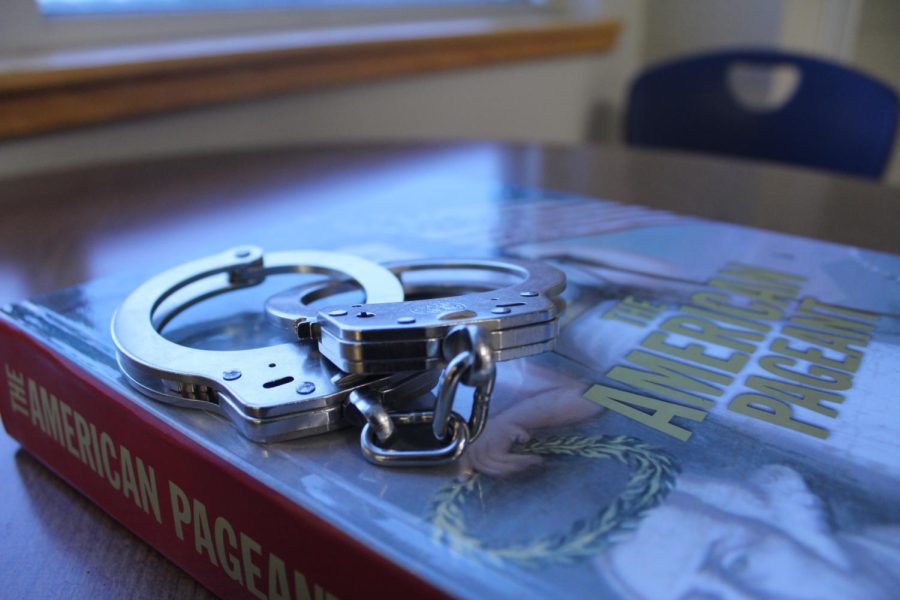Denying Critical Race Theory Denies History Itself
A new Texas law will remove certain parts of history that tell minorities’ experiences.
May 16, 2022
History is on a path to be rewritten. Gov. Greg Abbott signed a bill in the summer of 2021 restricting certain subjects from being taught in history programs. These prohibited topics are grouped under the umbrella term “critical race theory.”
The bill states, “with respect to their relationship to American values, slavery and racism are anything other than deviations from, betrayals of, or failures to live up to, the authentic founding principles of the United States, which include liberty and equality.”
Upon signing the bill, Abbot said there is still “more to be done” to “abolish critical race theory in Texas.” Critical race theory is a broad subject that covers many parts of American history, and some of its components include police violence against people of color, denial of affordable housing to minorities, unequal educational opportunities to people of color, higher rates of death in black women during childbirth, and lower longevity rates among people of color (compared to their white counterparts). Examples of systematic racism such as these represent only a small fraction of the racial underpinnings upon which our culture is based.
Denying the existence of racism in America dooms history to repeat itself and prohibits all people from learning the truth about our past. Citizens of the United States should be provided the right of a true education and precise facts so we can make well informed decisions in the future. Everyone should want to be accurately informed of the past of their ancestors. The catch phrase “critical race theory” acknowledges how deeply rooted racism is in society, and denying it is denying history itself.
The legislature of the State of Texas advises the State Board of Education to “adopt essential knowledge and skills that develop each student’s civic knowledge.” Civic education is a prime quality that shapes how future generations will run the United States. The children affected by this law grow up unaware of the ‘real world’, further conveying how legislation is throwing the children into a hypothetical deep hole which they won’t be educated enough to get out of.
Many teachers agree that history is about facts and is not a malleable ‘truth’ that politicians want to present as being real. Not informing future generations about past inequalities results in repeating the same indiscretions and mistakes that previous generations made. Denying an accurate account of history is robbing children of correct knowledge that should be readily available to them so that, as adults, they can avoid making the same errors. Changing the narrative on events, or erasing them all together, makes the hardships that any group of people experienced meaningless. When students question events that result from critical race theory, teachers agree they will answer with the truth.
Conservative lawmakers, critics and some parents believe that critical race theory assigns unfair guilt to innocent children, and that’s why they push for the bill. On the contrary, critical race theory ensures that students learn a true account of American history, and not an idealized version where all people are presented as having been treated equally, and forces them to acknowledge that United States history has never been equal.
The bill constrains teaching that “one race or sex is inherently superior to another race or sex,” or “an individual, by virtue of the individual’s race or sex, is inherently racist, sexist, or oppressive, whether consciously or unconsciously.” But a part of the curriculum that won’t be changing is about the history of the Texas Revolution, and that involves deeming one race as ‘good’ or celebratory for the people who were fighing for slavery, such as Stephen F. Austin, who is the hero fighting the deceitful Mexicans such as Santa Ana. This ongoing battle that humanity has, because of skin tone, is represented in everyday life. Consider how black Americans were deemed second class citizens and were objects to buy or sell to white people for over a hundred years, the Japanese were segregated into camps during WW2 and signs saying ‘Help Wanted – Mexicans Need Not Apply’ as just a few examples of racist policies where whites were deemed ‘superior.’ Jim Crow laws prohibited people of color from access to good schools for their children and denied them rights such as voting and many more inequalities in a country where “all men are created equal,” quoting the declaration of Independence.
Standing up for racism doesn’t involve cutting it out of the curriculum entirely and students want to be open to this information. Students agree that it would be an injustice to deny them the truth. From a young age people witness how racism affects them or their peers. Sociologists Michael Omi and Howard Winant explain racial evolution as the “process by which social, economic and political forces determine the content and importance of racial categories, and by which they are in turn shaped by racial meanings.”
The reality of humanity is that humans will continue to make mistakes. No one will have a flawless history. Learning a polished, fictionalized version of how our country was run, puts bumpers on the United States children’s perspective of the world. When researching the history of countries, there are multiple accounts of racial inequality through many cultures. The feelings conservative lawmakers, critics and some parents have towards how critical race theory claims to target white people is incorrect. Their idealistic version of white history should be told with the past in mind, and America’s children should have the equal opportunity to learn about all of the world’s (and the United States’) inequality to people so they can grow as a whole.

